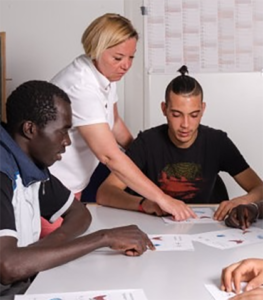Employer education would boost refugee jobs – report
Educating employers on the benefits of hiring refugees could improve employment rates among humanitarian entrants to Australia, new research has found.
More than 80 percent of asylum seekers and refugees remain unemployed 18 months after arriving in Australia, largely because they lack language skills, local networks and relevant Australian experience.
 But researchers at the University of Sydney found that employers who did hire refugees felt that the benefits far outweighed the disadvantages.
But researchers at the University of Sydney found that employers who did hire refugees felt that the benefits far outweighed the disadvantages.
And they have called on the federal government to consider measures including employer education programs as a way of encouraging firms to hire and retain humanitarian migrants.
The report, titled ‘Engaging business in refugee employment’ was compiled by a team led by University of Sydney Business School Associate Professor Betina Szkudlarek.
“Our report is based on a study which looked at the perceptions of employers who have and those who have not employed refugees. The aim was to gain insight into employers’ perceptions, misconceptions and experiences,” Dr Szkudlarek said.
She said employers who had hired refugees felt that the benefits outweighed the disadvantages.
“These benefits were the ability that refugees have to serve with cultural sensitivity a diverse customer base, their work ethic and commitment, international experience as well as diversity of views and expertise they brought to the workplace,” Dr Szkudlarek said.
She said many employers said that refugees’ productivity was higher than that of the local workforce.
The report made seven recommendations aimed at encouraging the employment and retention of refugees.
The report said that issues such as “visa status, work rights, uncertainty about the duration of stay and absenteeism were rarely a concern among employers who had employed refugees and who had sought to hire refugees”.
Many employers had simply not thought of turning to the refugee community in search of recruits,” Dr Szkudlarek said.
The report also recommends the identification of refugees in procurement programs as well as the facilitation of industry relevant interaction between Australian employers and refugee jobseekers through on-the-job training, mentoring, networking opportunities and other forms of professional support.
“Ultimately, the successful hiring and retention of refugees requires a long-term, holistic approach, involving management, the government and the community,” Dr Szkudlarek said.
Afghan refugee Liaqat Ali Akbari has recently gained an apprenticeship as a fork lift mechanic after an employer gave him a chance.’
Liaqat gained a Certificate III in Forklift Technology thanks to support from migrant and refugee settlement agency AMES Australia.
Liaqat was born in Afghanistan. His brother escaped from their war torn country and arrived in Australia in 2000 via an asylum seeker boat. Since then his elder brother has been able to bring Liaqat and another brother to Australia. However, their parents remain living in Afghanistan.
Before completing the forklift course Liaqat had been homeless and living in a youth hostel.
AMES Australia facilitated an opportunity for Liaqat with a local engineering business which offered him an apprenticeship.
Liaqat said he was keen to prove himself with his new employer.
“I am thankful for this opportunity and I plan to work hard to pay back everyone who has helped me,” he said.
Read the full report here: ‘Engaging business in refugee employment’ (pdf, 2.4MB)












